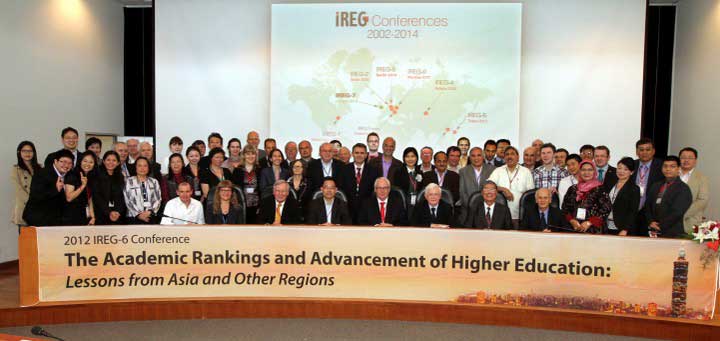
(Taipei, 20 April 2012) IREG-6 Conference, the premier international event of the year focused on issues of rankings and academic excellence in higher education, took place in Taipei on 18-20 April 2012. Organized by the IREG Observatory on Academic Ranking and Excellence and the Higher Education Evaluation & Accreditation Council of Taiwan (HEEACT), the conference drew together some 150 delegates from across the globe to consider myriad aspects of the event’s central theme, “Academic Rankings and Advancement of Higher Education. Lessons from Asia and other Regions”.
The scene was set by Jamil Salmi, a global education expert and former Tertiary Education Coordinator for the World Bank. He provided insight into a model for the making of world-class institutions, which relies heavily on three core “ingredients”: the acquisition (and retention) of top academic talent, formidable (and sustained) levels of funding, and a governance favorable to building and maintaining dynamic and innovative institutions of the highest academic quality.
Eight in-depth thematic sessions provided participants with an opportunity to discuss and debate everything from the newest initiatives and developments in the world of academic rankings, to methodological challenges and suggested improvements for the sector, institutional responses toward academic rankings, and their uses by some governments.
The issues of quality of higher education, and in particular “mutual reinforcement” between ranking and quality assurance efforts and accreditation exercise sat at the heart of much of the IREG-6 discourse. Several speakers pointed out that rankings, in many instances provide managers and government officials a clearer and more telling picture of the quality of higher education and its institutions than that revealed by the accreditation processes. Rankings also serve as a benchmark and stimulus towards forcing institutions to strive achieve higher quality. Presenters noted that rankings can serve as extremely useful guides for self-awareness and strategic action at the institutional and national level.
Due attention was given throughout the conference to the issues rankers themselves face, particularly in terms of methodological challenges, stakeholder inclusiveness, and transparency. For example, the extent to which student voices and perspectives are presented (or not) in university rankings at national and international levels was raised as a specific concern. Moreover, although progress appears to be ongoing, educating the public about the ways in which rankings can assist “end users” more broadly is another area where greater success could be realized.
New and innovative approaches to rankings were also explored, including the evolving interest in new focus areas, such as academic fields and subjects, regions, cities, and campus sustainability. And while cautionary voices were raised about the tendency to define academic “excellence” in ways that do not sufficiently value non-research activities, several presenters introduced cutting-edge products from the commercial sector that are specifically designed to assist institutions in mapping their research output and potential in ever more sophisticated ways.
The conference provided delegates with a diverse range of perspectives on rankings and quality in higher education. As natural for an event taking place in Taipei the largest group of speakers came from Asia including Nian Cai Liu (Shanghai Jiao Tong University, China), Riti Fitri Sari (University of Indonesia) and Angela Yung-chi Hou (HEEACT, Taiwan). Among speakers from Europe were: Andrejs Rauhvargers, (European University Association), Gero Federkeil (CHE, Germany) and Waldemar Siwinski (Perspektywy, Poland). A view on the rankings from Brazil’s perspective was presented by Luiz Claudio Costa, (National Institute of Studies and Educational Research), while Middle East was represented by Sadiq Sait Mohammed (King Fahd University of Petroleum & Minerals, Saudi Arabia). Canadian approach to ranking was presented by Roland Proulx (University of Montreal). The IREG-6 Conference was chaired by Jan Sadlak, President of IREG Observatory.
Following the conference, the IREG Observatory’s General Assembly admitted six new members: Aalborg University (Denmark), People’s Friendship University of Russia, University of Indonesia, St. Petersburg University (Russia), University of Navarra (Spain), and Wuhan Golden Apple Scientific Education Agency (China). IREG Observatory has now a total of 28 member organizations from Europe, Asia and North America.
The conference in Taipei was the 6th gathering of experts on academic rankings. Previous IREG meetings took place in Warsaw in 2002 (IREG-0), Washington in 2004 (IREG-1), Berlin in 2006 and 2010 (IREG-2 and IREG-5), Shanghai in 2007 (IREG-3), and Astana in 2009 (IREG-4). The next IREG-7 Conference will be held in London in May 2014.
More information: www.ireg-observatory.org
Contact:
